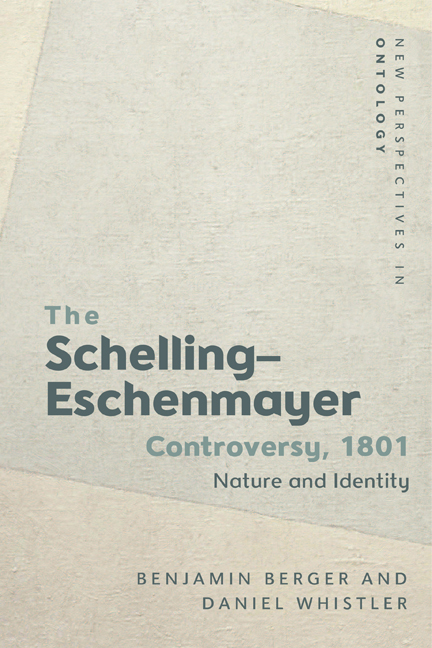Book contents
- Frontmatter
- Contents
- Preface
- Translators’ Note
- Abbreviations
- Introduction: Schelling and Eschenmayer in 1801
- Part I Texts
- Spontaneity = World Soul, or the Highest Principle of Philosophy of Nature
- On the True Concept of Philosophy of Nature and the Correct Way of Solving its Problems
- Part II Commentaries
- 1 Quality
- 2 Potency
- 3 Identity
- 4 Drive
- 5 Abstraction
- Part III Appendices
- Appendix 1 Correspondence, 1799–1801
- Appendix 2 Principles of Nature-Metaphysics Applied to Chemical and Medical Subjects [Extracts]
- Appendix 3 Deduction of the Living Organism [Extracts]
- Appendix 4 Review of F. W. J. Schelling’s First Outline of a System of Philosophy of Nature and Introduction to his Outline
- Notes
- Bibliography
- Index
Appendix 4 - Review of F. W. J. Schelling’s First Outline of a System of Philosophy of Nature and Introduction to his Outline
Published online by Cambridge University Press: 03 October 2020
- Frontmatter
- Contents
- Preface
- Translators’ Note
- Abbreviations
- Introduction: Schelling and Eschenmayer in 1801
- Part I Texts
- Spontaneity = World Soul, or the Highest Principle of Philosophy of Nature
- On the True Concept of Philosophy of Nature and the Correct Way of Solving its Problems
- Part II Commentaries
- 1 Quality
- 2 Potency
- 3 Identity
- 4 Drive
- 5 Abstraction
- Part III Appendices
- Appendix 1 Correspondence, 1799–1801
- Appendix 2 Principles of Nature-Metaphysics Applied to Chemical and Medical Subjects [Extracts]
- Appendix 3 Deduction of the Living Organism [Extracts]
- Appendix 4 Review of F. W. J. Schelling’s First Outline of a System of Philosophy of Nature and Introduction to his Outline
- Notes
- Bibliography
- Index
Summary
[529] Introduction to his Outline of a System of Philosophy of Nature, by F. W. J. Schelling. 83 pp. Jena and Leipzig, C. E. Gabler 1799.
First Outline of a System of Philosophy of Nature. For the purpose of his lectures by F. W. J. Schelling. 10 lectures and sketch. 321 pp. Jena and Leipzig, C. E. Gabler 1799.
Among the philosophers of our age there are two, above all, whose results remain equally (although in different ways) at the highest [point] that the human mind is capable of scaling. – I mean Fichte, the earlier founder of the doctrine of science [Wissenschaftslehre], and Schelling, the author of the [System of] Transcendental Idealism. Chance can have very little to do with this concurrence, for – what power does [chance] have when it is a matter of finding, under so many disparities, the true proportion; nor can it have much to do with dead and lifeless imitation, light borrowed from empty letters. This is the very point at which things cannot be learned, but [only] actively produced. What you are at this level, you can be only by active self-production. – What you create here passes through an organ which, like that of the aesthetic artist, is sustained on Prometheus’ frugal flame; when it comes to intellectual intuition, there are no instructions. The relation these two men have to Kantremains always, in respect to originality of thinking, one of inferiority, for to claim that even without Kant'slaborious study such heights could yet have been scaled is to repudiate the history of the human mind; in respect to principles, however, the relation is one of superiority. What Fichteachieved from a higher standpoint in the fields of natural right, morality and some related doctrines, Schellinghas done entirely for philosophy of nature (principally for chemistry and physiology), art and history.
It is here our aim to keep to the consideration of philosophy of nature. Schellinghas already dealt with this important subject in a series of writings. Furnished with fundamental philosophical principles, the highest tasks of this science were always going to stimulate him [530], but since he takes analysis into the detail of natural phenomena, a deeper knowledge of physics was also essential for him.
- Type
- Chapter
- Information
- The Schelling-Eschenmayer Controversy, 1801Nature and Identity, pp. 215 - 224Publisher: Edinburgh University PressPrint publication year: 2020



